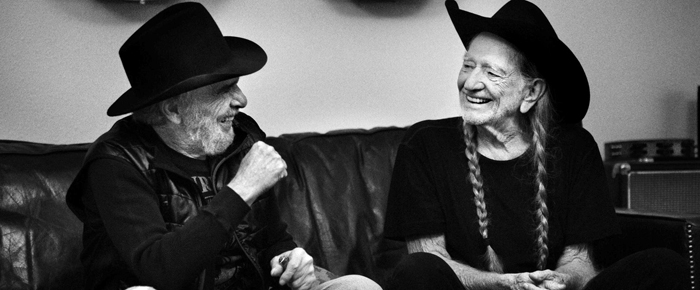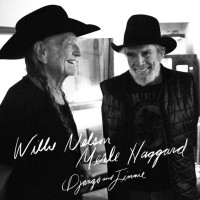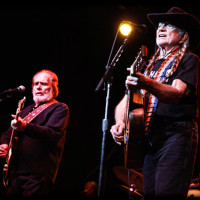
By Eleni P. Austin
Willie Nelson and Merle Haggard have been making music professionally since the middle of the last century. Between them, they have recorded more than 110 albums! Many of these records are considered classics, some are great and some are just okay. But whenever the two old friends record an album together, it’s a special occasion.
Willie Nelson was born in Abbott, Texas and began performing music while he was in elementary school. After a stint in the Air Force, he was a disc jockey by day and musician by night. He first gained recognition as a songwriter, writing classics like “Crazy,” “Hello Walls” and “Night Life,” which became signature hits for Patsy Cline, Faron Young and Ray Price.
Willie relocated to Nashville and slowly carved out a career as a Country Singer/Songwriter. He gravitated toward like-minded musicians like Kris Kristofferson, Waylon Jennings and Dottie West. Music City was wall-to-wall big hair, sequins and rhinestones. Willie and his crowd were seen as outcasts and outlaws.
After gaining a modicum of success, he returned to Texas, letting his hair grow long and his freak-flag fly. Willie began hosting an annual Fourth Of July Picnic that is credited with introducing Hippie culture to Honky Tonk music. By the end of the ‘70s, he was the superstar, but he achieved success on his own terms. The combination of his stellar song craft, idiosyncratic phrasing and gritty guitar style has cemented his popularity for close to 40 years.
Merle Haggard’s path to stardom was more circuitous His parents were part of the Dust Bowl migration that led them to Bakersfield, California during the Great Depression. His father fashioned a house out of a box car, and passed away when Merle was eight years old.
At age 12, his brother gave Merle a guitar and with the help of some Lefty Frizzell and Bob Wills records, he taught himself to play. But he was a rebellious teen and his exploits verged on juvenile delinquency.
He hitchhiked, rode the rails, and couldn’t stay out of trouble. In 1957 he was caught following a botched robbery. Sentenced to San Quentin, he planned escapes and constantly defied prison authority, until a co-conspirator escaped and killed a police officer.
His friend’s impending execution caused Merle to re-evaluate his choices. He earned his high school diploma and began working the system to his advantage. Seeing Johnny Cash perform at San Quentin re-kindled his passion for music.
Released from prison in 1960, he dug ditches and wired houses for his brother by day, pursuing a music career at night. Along with Buck Owens, Merle pioneered the Bakersfield Sound, a ragged mix of Telecaster twang, pedal steel and rustic harmonies.
By 1964 he had his first Top 10 hit, “(My Friends Are Gonna Be) Strangers.” That opened the floodgates, propelling Merle to the top of the charts. In 1969 he recorded his best known song, “Okie From Muskogee.” Although he now characterizes as a “humorous character study,” it engendered its share of controversy. The song was whole-heartedly embraced by Nixon’s so-called Silent Majority and perceived as a stinging indictment of Hippies, the counter-culture and the anti-war movement.
Willie and Merle had been friends for a couple of decades before they decided to collaborate in 1983. The resulting album, Pancho & Lefty was a commercial and artistic triumph. The album’s centerpiece was the title track. Written by Texas troubadour Townes Van Zandt, it offered a deft portrait of renegades and outlaws that seemed completely apropos.
Willie and Merle joined forces again four years later with the less successful Seashores Of Mexico. Another 30 years passed before they recorded Last Of The Breed, a trio album that included Willie’s musical mentor, Ray Price.
Now the duo is back with their first collaboration in eight years, Django And Jimmie. The title track, which opens the album, along “Missing Ol’ Johnny Cash” and “Don’t Think Twice, It’s Alright” pay tribute to heroes, fallen compadres and friends.
“Django And Jimmie” plays out like affectionate conversation between old friends. Powered by fleet acoustic fretwork and honeyed harmonica runs, the lyrics pay homage to Hot Jazz Gypsy guitarist Django Reinhardt and Jimmie Rodgers, the father of Country Music. Each musician was seminal influence on Willie and Merle.
“We love Hank and Lefty, Bob Willis, Ernest Tubb and Johnny Cash/But if we had to pinpoint the start of who we are, we would go back to Django and Jimmie/ A young singing brakeman, a Jazz playing Gypsy, might not have been a Merle or a Willie, if not for a Django and Jimmie.”
The melody of “Missing Ol’ Johnny Cash” is tethered to a clip-clop rhythm and accented by prickly guitars and rollicking piano notes. It trades on Cash’s signature Boom-chicka-boom sound. Here, Willie and Merle trade verses, playfully reminiscing about the Man In Black. They recall his generosity of spirit and his prankster sensibility, offering a window into their enduring friendship. “True he always dressed in black, but he loved folks and they loved him back/Carried his pills in a brown paper sack, well, I don’t care if they found his stash I’m missing ol’ Johnny Cash.”
Willie and Merle are peerless songwriters, and they pay tribute to their Rock & Roll counterpart, Bob Dylan, by covering his scabrous kiss-off, “Don’t Think Twice, It’Alright.” Liquid arpeggios and a galloping gait go a long way in sweetening Dylan’s cavalier dismissal. The instrumental break pares sugary guitar licks with sunny pedal steel notes.
Several songs here are accented by Willie Nelson’s trademark wit. Powered by peppery, Mariachi horns, “It’s All Going To Pot” delivers sly double entendre that takes aim at state of the world and also satirizes Willie’s predilection for ganja. “All the whiskey in Lynchburg, Tennessee just couldn’t hit the spot/I got a hundred dollar bill, you can keep your pills friend cause it’s all going to pot.”
“Alice In Hulaland” is an arch pastiche that mixes Honky Tonk with Hawaiina. Searing harmonica fills glide over shimmery slack-key guitar. The lyrics re-imagine Louis Carroll’s wide-eyed ingénue as a free-lovin’ groupie, living in the Aloha State. Willie rips a a wicked guitar solo on his trusty six-string steed, Trigger.
“It’s Only Money” shares some musical DNA with Willie’s classic, “Whiskey River.” The lyrics offer a lassiez-faire attitude regarding wealth and monetary rewards. “Well, it’s only money, it will go away/It’s only change in my pocket, it will get back to Merle someday/But it’s only money, it will go away.”
Finally, the rollicking “Driving The Herd” equates playing live music with leading a cattle drive, but it’s purely tongue-in-cheek. “I’m driving the herd, maybe I’m following, they’ll let me know if I’m doing it right/They’ll sing along with me every night, that’s how I know that they’re liking the show/Well, I’m driving the herd or maybe they’re driving me.”
Willie and Merle leave room for some gravitas. On “Unfair Weather Friends,” graceful keys, desolate pedal steel and high lonesome harmonica set the tone for this elegant ode to friendship that obviously has personal resonance. “I don’t have to wonder where you’ll be if I should need you/ All I have to do is close my eyes and I can see you, always there right where you belong.”
Anchored by wistful harmonica and percussive Trigger riffs, “Live This Long” offers a mordant take on the pair’s hedonistic past and surprising longevity. Merle wryly notes, “We’re in pretty good shape, Will, for the shape we’re in.”
“Where Dreams Come To Die” is a heartfelt lament that comes to terms with mortality. Celestial strings buttress soaring pedal steel and mournful Trigger chords as the duo offer this spiritual nugget; “This world is just a stop-over on the journey up to the sky.”
The pair re-configure a few classics from their considerable cannons. Willie’s “Family Bible” is a hushed gospel evocation. Merle contributes two tears-in-your-beers Classic Country weepers, “Swinging Doors” and “Somewhere Between.” The album closes with the lovely minor-key waltz, “The Only Man Wilder Than Me.”
An adroit wolf-pack of pickers and players back Willie and Merle. They include drummers Tony Creasman, Eddie Bayers and Lonnie Wilson, pedal steel man Dan Dougmore, bassists Kevin “Swine Grantt and Eli Beird, guitarists Shawn Camp, Mike Johnson and Bobby Terry. Keyboard duties were split between Catherine Styron Marx, Jim “Moose” Brown and Tony Harrell. Renato Caranto provided a honking sax solo on “It’s Only Money” and Merle’s guitarist son Ben and Willie’s longtime harmonica savant, Mickey Raphael colored outside the lines on every track.
Heavy-hitters like Jamey Johnson, Alison Krauss and Bobby Bare added harmonies here and there, but their contributions are overshadowed by Willie and Merle’s effortless charisma.
Django And Jimmie immediately muscled it’s way past the backwards-hat wearin’ bro-tastic acts that currently characterize the Country charts, debuting at #1. It is a great record, by turns, smart and funny, nostalgic and contemporary. Ultimately, it’s affectionate testimonial to the enduring music and friendship of Willie Nelson and Merle Haggard.












































